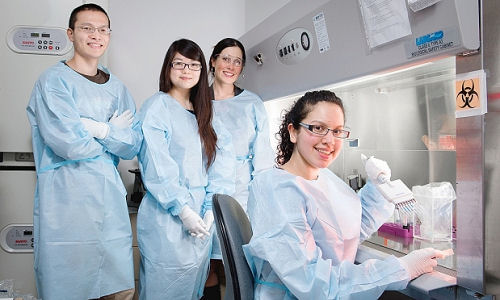A study tracing the evolution of HIV in North America involving researchers at Simon Fraser University has found evidence that the virus is slowly adapting over time to its human hosts. However, this change is so gradual that it is unlikely to have an impact on vaccine design.
Photo Credit: Wayne Leidenfrost
“Much research has focused on how HIV adapts to antiviral drugs—we wanted to investigate how HIV adapts to us, its human hosts, over time,” says lead author Zabrina Brumme, an assistant professor in SFU’s Faculty of Health Sciences.
The study, published today in PLOS Genetics, was led by Brumme’s lab in collaboration with scientists at the BC Centre for Excellence in HIV/AIDS, UBC, and sites across the U.S. including Harvard University, the New York Blood Center and the San Francisco Department of Public Health.
“HIV adapts to the immune response in reproducible ways. In theory, this could be bad news for host immunity—and vaccines—if such mutations were to spread in the population,” says Brumme. “Just like transmitted drug resistance can compromise treatment success, transmitted immune escape mutations could erode our ability to naturally fight HIV.”
Researchers characterized HIV sequences from patients dating from 1979, the beginning of the North American HIV epidemic, to the modern day.
The team reconstructed the epidemic’s ancestral HIV sequence and from there, assessed the spread of immune escape mutations in the population.
“Overall, our results show that the virus is adapting very slowly in North America,” says Brumme. “In parts of the world harder hit by HIV though, rates of adaptation could be higher.”
The study ends with a message of hope, Brumme adds. “We already have the tools to curb HIV in the form of treatment—and we continue to advance towards a vaccine and a cure. Together, we can stop HIV/AIDS before the virus subverts host immunity through population-level adaptation.”
Numerous SFU researchers contributed to the analysis, which required the careful recovery of viral RNA from historic specimens followed by laboratory culture. A trio of SFU graduate students, including health sciences student Laura Cotton, shared the lead author role.
“It was painstaking work,” says Cotton, “but it was fascinating to study these isolates in the lab, knowing that they had played an important role in the history of HIV on our continent.” Numerous undergraduate students, graduate students, postdocs and faculty including adjunct professor Art Poon and associate professor Mark Brockman were among other co-authors.
Story Source:
The above story is based on materials provided by Simon Fraser University.





